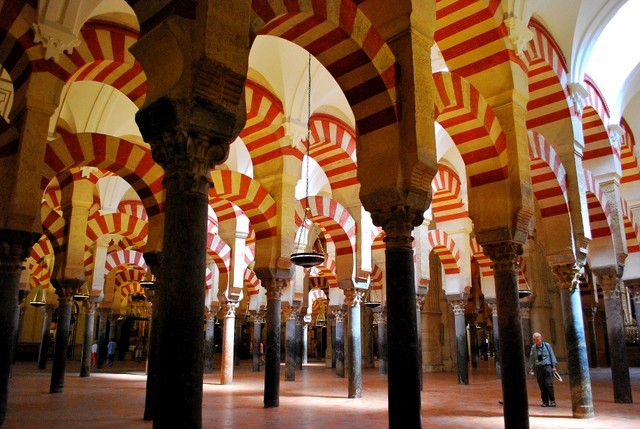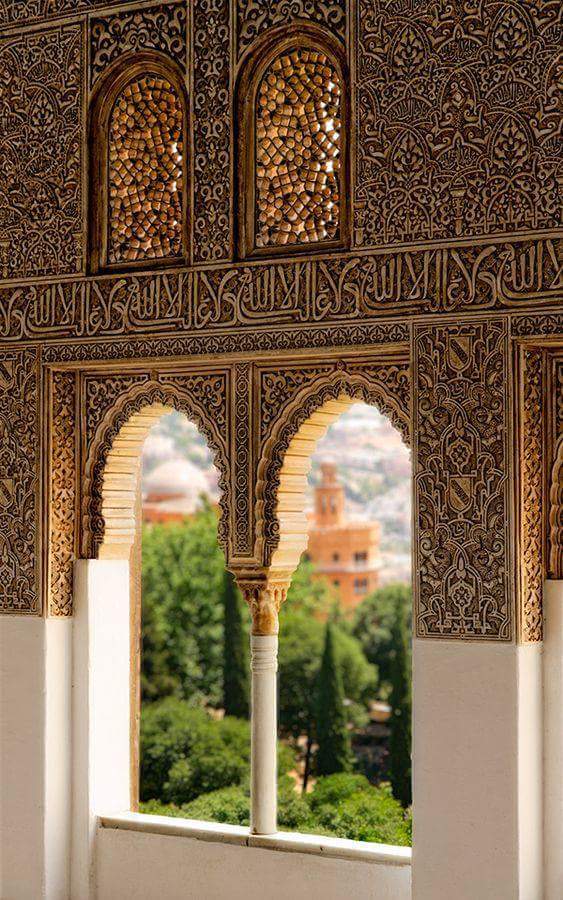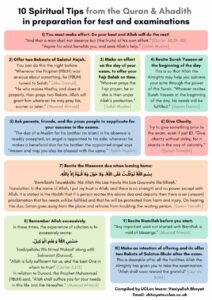Alhumdu Lillah! After having returned from the tour of Andalus with as-Suffa institute, it was a phenomenal experience and it left me in deep thought, worry and concern with regards to the lessons we can learn from Muslim Spain. I have decided to share my notes from the journey and the Dars of Shaykh Zahir (Hafidhahullah) with you all. Please forgive me if certain areas are brief and if there is a lack of references, as you can understand sometimes Hadith are mentioned but not under a reference. I will try to attach pictures where possible as well. If there is anything you would like further clarification about, please comment at the bottom. I would like to thank asSuffa from the depth of my heart for organising this trip, Allah reward them for their efforts and bless Shaykh with further knowledge and Barakah. Ameen.
عَنْ أَبِي هُرَيْرَةَ، أَنَّ رَسُولَ اللَّهِ صلى الله عليه وسلم قَالَ “ السَّفَرُ قِطْعَةٌ مِنَ الْعَذَابِ يَمْنَعُ أَحَدَكُمْ نَوْمَهُ وَطَعَامَهُ وَشَرَابَهُ فَإِذَا قَضَى أَحَدُكُمْ نَهْمَتَهُ مِنْ
وَجْهِهِ فَلْيُعَجِّلْ إِلَى أَهْلِهِ ” .
From Abu Hurayrah that the Messenger of Allah, may Allah bless him and grant him peace, said, “Travelling is a portion of the torment. It denies you your sleep, food, and drink. When you have accomplished your purpose, you should hurry back to your family.” (Muwatta Malik).

Normally, we are in our daily routine, we do the same thing every day. We do not realise things about ourselves, our habits and temperaments etc. When we travel on a journey, especially with others these habits come out. Like we can see from the above Hadith, travelling deprives us from our food, sleep and drink etc. We all know what happens when we take a man’s sleep or food away. The quote of Umar (Allah be pleased with him) is famous, about how you only truly know a person once you have travelled with him.
Umar (Allah be pleased with him) asked about a man who had given testimony, wanting to find out whether anyone could vouch for him. A man said to him: “I will vouch for him, O’ Ameer al-Mumineen, ‘Umar asked, “Are you his neighbour?” He said, “No.” He then” asked, “Did you mix with him for a day and come to know his character?” He said, “No.” He asked next: “Did you travel with him, for traveling and being away from home reveal a man’s true essence?” He said, “No.” ‘Umar said, “Perhaps you saw him in the-mosque, standing, sitting and praying?” He said, “Yes.” ‘Umar said, Go away, for you do not know him.”
A very profound saying, when travelling with others especially in a group, our true colours are revealed through our conduct as:
1. Much patience is required because people desire & think differently.
2. Whilst we should neither keep others waiting nor impose our views on the rest, we should be prepared to be delayed by others as that is part of group travel.
3. We should be ready to serve the rest.
4. We should abstain from petty complaints.
5. We must be considerate of others esp. the weak, elderly & children.
 Why do we study history?
Why do we study history?
A great portion of the Qur’an speaks about history, approximately 1/3. When one reads history it is as though he is reading the future because history often repeats itself, so if we can’t learn from our own mistakes we can learn from the mistakes of others. As we all know a man’s nature doesn’t fundamentally change.
“Narrate to them stories (of the past), so that they may reflect.” (al-A’raaf)
“We narrate to you [O Muhammad] the best of stories in what we have revealed to you of this Qur’an, although, you were, before it, from the unaware.” (Surah Yusuf)
Nations ascend and descend, some disappear. Nations ascend because they have something called impetus.
Ibn Khuldoon (Allah have mercy on him), he has a theory, the ‘cycle theory’ which scientists still use today. Anyone who has a surname ending in ‘doon’ or ‘coon’ means their ancestors were form Andalus.
Once upon a time the population was over 75% Muslims in Spain.
Umar (Allah be pleased with him) was sat one day, very worried. So, someone asked him as to why he look worried. As Islam was spreading far and wide into India and Central Asia and Africa. Umar (Allah be pleased with him) replied, “This is why I am worried!”
What Umar (Allah be pleased with him) was referring to was that most nations reach their pinnacle and prosperity, then they decline.
“And you will not find in our way (Sunnah) any alteration.” (17:77)
Allah has some principles that never change, in the same way man has some habits which never change. For example, water boils at 100 degrees, it has always boiled at 100 degrees.
We must remember Islam is continuous and will remain at all times. It is the truth and the truth must reach the people.
The word al-fath in Arabic means to conquer or open. Islam spread by sending armies to countries. They were not forced. Countries as far as Yugoslavia, Greece and Caucasus. There were two countries where armies were not sent and they accepted Islam, Indonesia and Malaysia.

Why study history of Spain?
Spain is very close to us British Muslims in Europe.
Only 1% of Muslims came to Spain, they went from a minority to a majority, then back to a minority. You had both types of leaders, good and evil. You had pious and knowledgeable leaders as well as very bad, very treacherous and very deceitful leaders.
You wonder why Muslims would become sell-outs and give in to the Christians. The answer is simple, if in 100 years’ time today’s history was written, people would say how did Burma happen, how did the issue of Palestine not get solved, how did Muslims get oppressed in Syria?
Just like we think today why did Muslims allow the Spanish to get 400 years of persecution. Morocco is 12 miles away from Spain, why didn’t they help?
Similarly, many places were pre-dominantly Muslims, but they no longer remain the majority. Like Malawi and Philippines.
Why have so many scholars/poets written about Spain?
- Far out-post of Islam
- Because of what it created. There was no place in the world equal to it.
Many people when hearing about the situation of the Ummah – current or past, tend to say, “Let them do what they want, this is Allah’s Deen.” My answer to this is do not live off slogans, live off actions/a’maal. Also, remember, Allah will protect his Deen, but will Allah protect you? Especially if you don’t act accordingly.
Background
The word Andalus is the Arabic name for the Iberian Peninsula what is known today as Spain and Portugal, the Greeks called it Iberia and the Romans called it Hespania. The land of Spain was ruled by the following, before the Muslims:
Greeks
Celts
Romans
Vandals
Visigoth
The Romans brought the Latin language and Spanish evolved from there. The word Andalus came from the word Vandals, these were people who were rough and evil.
The Muslims were generally known as Saracens or Moors.
Visigoths were Pagan but later embraced the Catholic religion. Within 200 years of ruling they began to oppress others and treat them like animals. Although the Goth conjures up a Barbarian perception, they inherited an advanced society with theatres, dams, bridges and circuses. An advanced political system all of which the Goths benefited from.
What was going on in Europe when the Muslims came?
The Europeans were generally unclean and unhygienic. They only bathed once a year, or at the most twice a year. This is because they thought it weakened their immune system. James Burke describes they mixed their impurity (stool and urine) in the middle of the road and walked in it. They had no issues with that nor was it frowned upon.
Amr ibn al Aas (Allah be pleased with him)
At the shortest point, there are only 12 miles between North Africa and Spain. Amr ibn al Aas (Allah be pleased with him) was the first person to conquer Africa, he was very intelligent. When he left Makkah, Khalid ibn Waleed (Allah be pleased with him) said, “Today Makkah has thrown away her liver.” When Umar (Allah be pleased with him) sent him to North Africa, he later sent a letter with a messenger:
“If this letter reaches you before the Rafah border, then do not cross it. If you have crossed it, then no matter.”
When Amr (Allah be pleased with him) received the letter, as he was intelligent he knew what it would have said – not to cross! So he crossed the border, then read it!
Uqba ibn Nafi (Allah be pleased with him)
After Amr ibn al Aass (Allah be pleased with him) the next conqueror to embark on the conquest of North Africa was Uqba ibn Nafi (Allah be pleased with him). He was the nephew of Amr ibn Aas (Allah be pleased with him). He was appointed the governor of North Africa in 50/67. He took great portions of Egypt with 4,000 men. He was ambushed on his return and martyred. He passed away in 638 A.D. Islam reached North Africa 23H.
Nusayr (Allah have mercy on him)
Nusayr (Allah have mercy on him) was studying to be a monk when Khalid ibn Waleed (Allah be pleased with him) conquered Ayn Tamr. He was born a Christian who embraced Islam. Employed by Muawiyah (Allah be pleased with him), he was in charge of the police. When the battle took place between Ali (Allah be pleased with him) and Muawiyah (Allah be pleased with him), Nusayr said his famous words to Muawiyah (Allah be pleased with him) when he rebuked him:
“I will not show my gratefulness to you by showing my ungratefulness to He who is greater than you.” Muawiyah (Allah be pleased with him) asked, “Who is that?” He replied, “Allah!” Muawiyah (Allah be pleased with him) put his head down and said, “Astaghfirullah.”
He once said about Uqba (Allah be pleased with him), “Did nobody tell Uqba (Allah be pleased with him) to consolidate what you have then advance?” This was because was Uqba (Allah be pleased with him) was conquering lands but not consolidating the areas i.e. educating them, building ties and winning the hearts of the local people. His son was Musa ibn Nusayr (Allah have mercy on him), who conquered the entire North Africa and Andalus. He was the most important man in the history of Spain.
Musa ibn Nusar (Allah have mercy on him)
He was born in 19H during the Caliphate of Umar (Allah be pleased with him). He was a Tabi’ee and narrated from the Sahabah (Allah be pleased with them). He began to assess the reason why the Berbers could not be kept in check. By 91H he had the entire North Africa subdued. He began to assess the reason wy the Berbers could not be kept in check. He realised that the victories were achieved very quickly without the consolidation of the conquered land. Uqba (Allah be pleased with him) would take a country swiftly, but only to rebel later. So he decided to consolidate any land that was conquered and win the hearts of the people. Once he was happy with the situation, only then he would move on. Secondly, no system of education was provided for the conquered people, so he brought scholars to educate them, until the Berbers began to love Islam and became great defenders of the religion. He built Madrasahs everywhere he went.
On a side note here, Shaykh Zahir mentioned, “short bursts don’t last long.” If we look at the French, they spent 130 years in Algeria. But, they didn’t convert a single person, why? Simply because they didn’t consolidate and win the hearts and minds of the people.
Remember, Da’wah has to be multi-faceted, Da’wah must be consolidated. There are many people out there giving Islam a bad name, we need to give Islam a good name in the right manner.
The first person to mention the conquering of Andalus was Uthman (Allah be pleased with him), when he talked about the conquering of Constantinople. The Prophet (peace and blessings be upon him) said, “Muslims will conquer Constantinople.” Everyone wanted to be a part of this army. 27H was the first time Muslims came to Andalus, they just stopped at the port.
When Muadh ibn Jabal (Allah be pleased with him) went to Roe, the Byzantines said, “Why are you going to attack us? Go to Ethiopia it is easier for you.” Muadh (Allah be pleased with him) related the verse:
“O you who believe! Fight those who re close to you of the disbelievers. Let them find in you harshness. And know that Allah is with those who fear him.” (9:123)
Umar (Allah be pleased with him) was very impressed by the history of Persia.
In an Islamic society in which the basic beliefs and principles are both deeply-rooted and dominant, behavioural motives are greatly influenced by the aspiration to please Allah and gain His reward in the hereafter. The best Muslim believers do not include any other motive for their actions. It is essential for the Muslim to ensure that his intention in all his deeds is aimed solely at pleasing Allah, be they acts of self-purification, or any social, economic, or political activities. The activities of a Muslim in all spheres of life must be directed towards pleasing God. The Muslim knows well that if he were to include anything else in his intention besides God, then his deed would be unacceptable, as stated in the hadith: “Allah does not accept any deed except that which is purely intended for Him and is done for His sake.” If this way of thinking is guiding many conscientious Muslims even today, then what was its influence on the generations of the companions of the Prophet and those who followed after them (tabi`un), who were the best of all generations?
The knowledge of the effect which Islam exerted on the education of its followers in the first period of Islam – and on the purification of their souls, and polishing their minds, the sincerity of their religious belief, together with their directing their worship to God alone – makes it abundantly clear that their participation in the military campaigns known as al futuh (the conquests or ‘opening up’ of other lands) was not primarily motivated by any worldly ambition. Rather, it was the compelling desire to propagate Islam, to enable it to take firm root in these lands and to organize and administer the newly-conquered territories. It was the wish to solve the economic problems of these lands, and any new problems which might arise, in accordance with the true teachings of Islam. The Muslims were not motivated by any desire to dominate those peoples or to acquire their wealth, nor were they attempting to escape from the hardship of life in the desert, as has been maintained by Caetani and other Orientalists.
Al Tabari (Allah have mercy on him) narrated that Rabi` ibn `Amir (Allah be pleased with him) entered the court of Rustum, the Persian leader, who asked him: “What brought you here?” Rabi` (Allah be pleased with him) said: “God sent us, and He brought us here in order to lead whom He wills from the worship of man to the worship of God alone; from the narrowness and oppression of this world to the space and abundance of the hereafter; and from the injustice of other religions to the justice of Islam. He has sent us with His religion of His creation, to call them to Him.”
What Rabi` ibn `Amir (Allah be pleased with him), the representative of the Muslims, said to the Persians was not only the expression of his personal feelings. Rather, it voiced the thought which was predominant among the Muslim leadership and most of the Mujahidin. This does not exclude the possibility that some of the Bedouin who had participated in the military expeditions had been attracted by the prospects of material gains and booty, in addition to the desire for jihad; but these Bedouin did not represent either the leadership of the movement or its motivating spirit. We must state this because the Muslim society is a human society. In it are found the elite who are committed to the highest moral and spiritual ideals, with their intentions directed purely towards God, who are desirous of earning His good pleasure and who direct their efforts towards achieving this end. But there are also lesser classes of Muslims who take it upon themselves to maintain the minimum standards which will entitle them to call themselves Muslims.
We must explain clearly that the interpretation of the course of Islamic history during the first period of Islam can only be undertaken by a Muslim who repeats daily what God said to his Prophet: “Say: ‘Truly my prayer and service of my sacrifice, my life and my death, are (all) for God, the cherisher of the worlds: No partner hath He; this am I commanded …’”. (Al-An`am 6:162-163). This is the Muslim whose mind and emotions have been affected by the Qur’an and the Sunnah, who has felt their impact in moulding his personality and determining his actions and conduct. This is why Westerners and Orientalists have failed to understand the true motives for the actions of Muslims during the first period of Islam. For example, when Henri Lammens, a well-known Orientalist, discussed the incident of the Saqifah of Banu Sa`idah (an early example of the application of the Shura, in which the majority was persuaded by the minority) his judgment of this incident was impaired by his recollections of the conspiracies at the French court of the fifteenth and sixteenth centuries, which distorted his eventual depiction of the incident. He concluded that the outcome of the meeting of Saqifah came about as the result of a conspiracy woven by Abu Bakr (Allah be pleased with him), `Umar (Allah be pleased with him) and `Uthman (Allah be pleased with him), who, in the Saqifah of the Banu Sa`idah, had agreed to seize the caliphate and succeed one another.
The studies of the Orientalists are numerous, and differ in their levels, quality, and freedom from religious and racial prejudice. However, these studies are usually carried out by scholars who live in environments which are remote from Islam, and which have their own philosophies and cultures. It is difficult for them to appreciate Islam and consequently, it is difficult for them to understand the true reasons for a Muslim’s conduct, both individually and socially. When they seek to interpret the history of Islam, they draw analogies with European history, despite the very different natures of the two histories. We must not forget, moreover, that the Europeans cannot but help looking at the world from their own perspective, which is militarily and technologically superior. Thus they tend to ascribe every possible merit to themselves, while ascribing defects to others. When Toynbee wrote his history of world civilizations, he allotted only a small space to the history of Islam, a space which was not commensurate with the size of Islam’s real contribution to world history.
The most glaring deficiency of the Orientalists’ studies is their failure to arrive at a correct understanding of Islam, its true spirit, and its effect on an Islamic society and on the course of that society’s history. This is a grave deficiency which prevents our acceptance and approval of these studies, especially those which are concerned with the Sirah and the era of the Rightly-guided Caliphs, when the practical implementation of Islamic theory coincided with the theory itself and faithfully reflected it.
Hitler once said, “Victorious are those who write history.”
“History would be kind to me, because I am going to write it.” – Winston Churchill
So, history belongs to those who write it. And history doesn’t do justice to Umayyads, it was written by Abbasids.
The Umayyads spread Islam in three different directions:
Muhammad ibn Qasim al-Thaqafi (Allah have mercy on him) = Sindh
Utaybah ibn Muslim al-Bahili (Allah have mercy on him) = China
Muslamah ibn Abdul Malik = Caucasus

Julian
The ruler of Spain at the time, before the Muslims conquered was a man called Roderick. He had sexually abused many young boys and girls at the time. One of which was the daughter of Julian, her name was Flora. This angered Julian, when he came to know if it and sought after help from the Muslims. This was because Musa ibn Nusayr (Allah have mercy on him) was already planning an attack on Andalus. But he said to Julian, “I cannot trust you, as you are a Christian and so is Roderick. And we are not familiar with the landscape of Andalus.” He tells Julian to initiate the attack to prove he is strong on his word. Julian attacks eastern coasts of Andalus, then reports back. Musa (Allah have mercy on him) then reports back to the Caliph in Baghdad – Waleed ibn Abdul Malik, who then sends a small army.
Tariq ibn Ziyad (Allah have mercy on him)
He was a Berber, he was blue-eyed and had blonde hair. It is said, that Berbers descended from Europeans.
Furthermore, a wife of a sorcerer when seeing Tariq said, “Your appearance resembles that of the conquerer of Andalus about whom my husband predicted.” She recognised him by a mole, Tariq (Allah have mercy on him) had a mole on his face. Tariq ibn ZIyad (Allah have mercy in him), landed in Gibraltar in 711/92 with 7,000 men and 300 Arab nobles. A stretch which is about 11 miles. He requested further reinforcements and the army swelled up to 12,000. The armies met at La Junda.
Tariq had a dream which inspired him and the soldiers. He saw the Prophet (peace and blessing be upon him) and his companions with their swords out, giving him glad tidings of a victory.
Roderick was the last Gothic King, he usurped the throne after the death of king Wizita. He was 80 years old at the time of the battle. Roderick confronted Tariq (Allah have mercy on him) with an army of 100,000. The two armies met at Guadelate. Musa prepared the Muslims, especially Berbers for Jihad. He placed at the head of the army, the most suitable person, Tariq ibn Ziyad (Allah have mercy on him).
So Musa (Allah have mercy on him) now sends Tariq ibn Ziyad (Allah have mercy on him) with an army. Tariq was considerably young. This is something which shouldn’t be frowned upon, as the last army which the Prophet (peace and blessings be upon him) sent had Usamah (Allah be pleased with him) as the commander under him were great Sahabah (Allah be pleased with them) like Umar (Allah be pleased with him) and others. The reason why Tariq (Allah have mercy on him) was chosen was due to his admirable piety and his inexhaustible desire for Jihad. Also, we must remember that Musa (Allah have mercy on him) was an Arab and Tariq was a Berber, the majority of the army was Berber. Tairq understood the culture, language and habits of the Berbers. An important point to note here is when giving Da’wah, especially abroad, we must also understand that culture, language and habits of the people. Another noteworthy reminder is that Musa (Allah have mercy on him) chose the best man for the job, he didn’t look in finding an Arab. He looked for who suited the role. “O mankind! We have created you from a male and a female, and made you into nations and tribes, that you may know one another. Verily, the most honourable of you with Allah is that (believer) who has al-taqwa [i.e., is one of the muttaqoon or pious]. Verily, Allah is All-Knowing, All-Aware” [al-Hujuraat 49:13]
The Prophet (peace and blessings of Allah be upon him) said in his last sermon: “O people! Verily your Lord is One and your father [Adam] is one. An Arab is no better than a non-Arab, and a non-Arab is no better than an Arab; a red man is no better than a black man and a black man is no better than a red man – except if it is in terms of taqwa (piety)…” (Reported by Imam Ahmad, 22391).
Unfortunately, we do not see this in our society today. Not even in Islamic institutes. When a father dies he makes his son the Ameer or principal, although he may not be fit for the role. We will see more examples of this causes failure in the history of Spain.
To the south of Spain there are three islands known as Balearic Islands; Ibiza, Majorca and Minorca.
Musa (Allah have mercy on him) first consolidated his power in these islands then moved on to Spain. Tariq (Allah have mercy on him) first landed on “Jabalut-Tariq,” which is known as Gibraltar today. He has a few battles then consolidates al-Jazeeratul Khadhra (Green Islands), also known as al-Jasairas. Meanwhile, Roderick was already having a battle in another country. His men sent him a message,
“We have been attacked! There are 7,000 men. Men, the like of which we have never seen before. We do not know if they are from Heaven or from Earth!”
Roderick pondered and thought, 7,000 is a small number and we will easily defeat this army.
I would like to narrate a story at this point, but unsure if it is true and authentic: A king had a dream many years ago before this war, that someone will come and takeover Spain. He went to a magician, and the magician confirmed this is true. But he said he will help the king by casting a spell in a room. So long as you do not open the door of this room, Spain is safe. This message was passed on each time a king passed away. Every new ruler would put an extra lock on. But when Roderick heard about this he was anxious to find out, what was in the room. He was advised by his ministers not to open the locks, but he refused to listen. They even said, “We will give you double the amount of gold of what is in there.” He ignored them and opened 27 locks! Inside was a table from the period of Sulayman (peace and blessings be upon him) and many other things were found. (Ahmed Thompson)
The battle started on 28th Ramadhan 22H/19th July 711and carried on for 8 days. The Muslims were fighting on Eid as well! The Christian army was five times the size of the Muslim army, Musa sent another 5,000 men which totalled 12,000 for the Muslims. When Roderick saw them, he lost his appetite. He sent emissaries to speak to them, Musa (Allah have mercy on him) beheaded the messenger and then they cooked him and sent him to the Christians. This was to give an impression to Roderick of how courageous they were. The Prophet (peace and blessings be upon him) said, “War is a deception.” Which means sometime what we think of the other party in terms of numbers and weaponry isn’t always as it seems. It is for this same reason we do ‘Ramal’ (jogging with the chest out) in Tawaf (circumambulation of the Ka’bah).
Tariq (Allah have mercy on him) led from the front, he was dressed simple and looked humble. Whilst Roderick was arrogantly sat on his throne, dressed in his crown and robes. You could say the Christians were ‘playing at home’, they were on their own land. But, slowly, the Muslims got the upper hand. Roderick knew the only way the Muslims could defeat them was to kill him, so he stayed behind his army. Finally, Tariq (Allah have mercy on him) attacked Roderick and killed him. They found one sandal of Roderick’s, which was worth 100,000 Dinar. He was the last Visigoth King of Spain. Tariq’s army was thoroughly enjoying the booty. He once said, “If you carried on with me, I would go all the way to Constantinople.”
We stopped here and Shaykh mentioned a point which every Muslim should remember and instil:
We should never be proud just on the basis of being Muslim. Just being Muslim will not get us anywhere! We need a vision and we need to become “people of substance.” I call these Shaykh’s favourite lines (hope he doesn’t mind), rightly so as well. Many of us rely on the fact we pray the Kalimah/Shahadah or we pray Salah and adorn a beard and sisters wear Hijab – which is all good and well, but not sufficient. The price of Jannah is not cheap! We are over a billion today, but let not our numbers deceive us. We need substance:
Look on the day of Badr, only 313. But they had substance! Allah says: “And Allah had given you victory at [the battle of] of Badr, while you were weak.” (3:123) The Arabic word ‘Athillah’ here means – i) few in number ii) disgraced and humiliated. So, here they were few but overcame 1,000 because they were humble and obeyed.
Let us look at the next battle after Badr – Uhud. Muslims had the upper hand initially. But 50 archers on a hilltop were ordered by the Prophet (peace and blessings be upon him) not to move from their places, if they are winning or losing or even vultures are pecking at their bodies. When the Muslims had the upper hand, these archers started rejoicing forgot the command of the Ameer SAW and descended. Which resulted in Muslims losing the upper hand. Again, we learn the lesson of following the Ameer – no matter what.
Numbers also deceive the Muslims, Allah talks about the battle of Hunayn. Muslims were many in number so thought they will ultimately win the battle. The battle turned upside down, they even left the side of the Prophet (peace and blessings be upon him), only ten Muslims were left with the Messenger (peace and blessings be upon him). Unfortunately, 3,000 Muslims were martyred. Inna Lillah… “Allah has already given you many victories and [even] on the day of Hunayn, when your great number pleased you.” (9:25)
Now, we would like to make some clarifications about the story so far, particularly about Tariq ibn Ziyad (Allah have mercy on him):
Did Tariq ibn Ziyad (Allah have mercy on him) burn the ships on the shore of Gibraltar?
This is a fabrication from amongst the fabrications told in history and there are many reasons for this –
- The ships did not all belong to Tariq, Julian owned most of them.
- Fuqaha RH did not speak about this incident and Ulama RH have not wrote about it.
- Waleed ibn Abdul Malik who was the Caliph at the time did not mention it.
The second fabrication was the famous Khutbah which Tariq ibn Ziyad (Allah have mercy on him) and has been attributed to him. Many scholars say that this was not given by Tariq. Simply because he was a Berber, and the Arabic was too eloquent.
In Islam before attacking a land the enemies were offered three choices:
- Accept Islam
- Pay the tax/Jizyah – 1 dinar
- Fight against us
If a non-Muslim defended the Muslims or their army, Umar (Allah be pleased with him) uplifted the Jizyah from them. There was a certain time in the era of Abu Ubaydah (Allah be pleased with him) when the Muslims could not protect the non-Muslims. Their enemy was too strong, Abu Ubaydah (Allah be pleased with him) gave the Jizyah back to the non-Muslims. In the time of Umar (Allah be pleased with him), he saw a Jew begging. Umar (Allah be pleased with him) asked, “Why is he begging when he pays Jizyah?” He went to their leader and said pay him from Baytul Maal.
The rule was, you can only take Jizyah from those who can afford it.
Jews
When the Muslims came to Spain the Jews flung their doors open. The Jews had been persecuted by the Christians and were pleased to assist the Muslims. The Muslims even left the Jews in charge of many cities as they advanced; cities such as Cordoba, Granada and Malaga. Whilst the Christians were in the churches praying, the Jew flung open the doors of the Forts for the Muslims.
The largest Jewish population was in Muslim Spain.
Heretical Christian Sects
There were many Heretical Christian Sects. If you belonged to a group besides Catholicism life was hard for you. The Muslims then arrived and gave refuge to the heretic Christian refugees. It reminded people of Najashi giving refuge to the Muslims, this was like the Muslims paying Najashi back. Many people had previously sold themselves as slaves to the church or to Christians. As it was much easier, because their food and home was guaranteed. Now, so many Christians were flocking to Islam.
There was only one Sahabi, Munayzir al-Afriqi (Allah be pleased with him) who came to Spain. From 12,000 Muslims one Sahabi, the rest were Tabi’een (mostly).
Some European historians said: “Tariq beat Roderick up and imprisoned him.” The Muslims don’t have any record of this.
The son of Musa ibn Nusayr, Abdul Aziz (Allah have mercy on him) took Portugal. Musa (Allah have mercy on him) had now taken 18 cities.
Muslims showed tolerance like never before.
Muslims encouraged inter-marriages, Arabs marrying Berbers etc. This is why they felt the unity.
By 811 A.D Spain was 8% Muslim.
By 850 A.D. Spain was 12% Muslim.
By 900 A.D. Spain was 25% Muslim.
By 950 A.D Spain was 50% Muslim.
By 1000 A.D. Spain was 75% Muslim.
Ismail ibn Nazir Satia (One who is in dire need of Allah’s forgiveness, mercy and pleasure)
7 Sha’ban 1437
















 Why do we study history?
Why do we study history?









